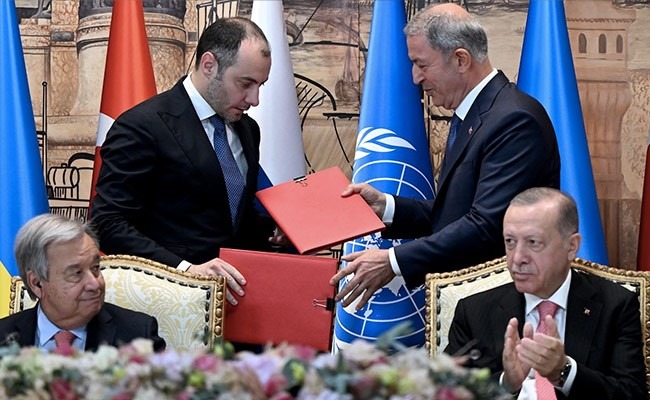| Translate This News In |
|---|
A historic agreement between Ukraine and Russia was signed on Friday, capping months of discussions and bringing wheat prices to lows last seen before Moscow’s invasion. The agreement aims to ease a worldwide food crisis brought on by halted Black Sea grain shipments.
The United Nations estimates that an additional 47 million people are suffering from “acute famine” as a result of the war, and the first significant agreement between the combatants since the invasion of Ukraine in February should help alleviate this situation.
Conflicts over the placement of flags around the table and Ukraine’s refusal to have its name on the same document as the Russians briefly delayed the signing ceremony as the enmity between Moscow and Kyiv spilled over.
In the end, the two parties signed separate but similar agreements in the presence of Turkish President Recep Tayyip Erdogan and UN Secretary General Antonio Guterres in Istanbul’s opulent Dolmabahce Palace.
Just before the agreement was signed, Guterres declared: “Today, there is a beacon on the Black Sea — a beacon of hope, a beacon of opportunity, a beacon of relief.”
The pact, according to Erdogan, a significant actor in the negotiations who enjoys cordial ties with both Moscow and Kiev, will “perhaps reinvigorate the route to peace.”
But Ukraine began the event by adamantly stating that should Russia break the deal and assault its ships or stage an incursion outside its ports, it will execute “an urgent military response.”
Later, Ukrainian President Volodymyr Zelensky stated the UN, which is one of the agreement’s co-guarantors along with Turkey, will be in charge of enforcing the agreement.
20,000,000 tonnes of wheat
The agreement has provisions for routing Ukrainian grain ships through safe routes that steer clear of known mines in the Black Sea.
Russian warships and landmines Kiev planted to prevent a predicted amphibious attack have barred enormous amounts of wheat and other commodities from entering Ukrainian ports.
Zelensky estimated the worth of Ukraine’s grain reserves at about $10 billion and stated that approximately 20 million tonnes of the current crop and last year’s harvest would be shipped under the deal.
Despite some analysts’ scepticism of the agreement, wheat prices fell after the agreement to levels last seen before Russia’s invasion.
Wheat for delivery in September cost $7.59 a bushel in Chicago, which is the same as about 27 kilogrammes, a 5.9 percent decrease. Similar price decreases occurred in Europe.
After the signing ceremony, Sergei Shoigu, the minister of defence for Russia, informed the official Kremlin media that he expected the agreement to go into effect “within the next few days.”
He cited the fact that Russia had been successful in obtaining a separate commitment from Washington and Brussels to remove all limitations on its own grain and other agricultural exports.
While pushing Moscow to comply by its conditions, the United States and European nations praised the pact.
According to a US official, the agreement was “well-structured” enough to track Russian compliance.
The “rapid implementation” of the agreement was demanded by the European Union, and British Foreign Secretary Liz Truss stated that London “would be watching to ensure Russia’s actions match its words.”
hesitant hope
Only by mid-August, according to diplomats, should grain begin to flow properly.
In order to track the ships’ progress and resolve disagreements, the four parties must first establish a joint command and control centre in Istanbul.
The specifics of how the ships will be inspected for armaments before returning empty to Ukrainian ports are still being worked out.
Farmers in Ukraine who had been seeing their silos fill up with grain they were unable to sell were cautiously optimistic when the Istanbul agreement was announced.
Mykola Zaverukha, a farmer, stated that “it gives some hope, but you can’t believe anything the Russians say.”
As this year’s harvest started to come in, his silos, which already held 13,000 tonnes of grain, were in danger of overflowing.
In the southern Mykolaiv region, he told AFP, “Russia is dependable; they have demonstrated this year after year.”
Concerns in Europe about Russia beginning to use its monopoly on energy exports as a geopolitical weapon in its conflict with the West have been accompanied by widespread worry over that grain.
The grain agreement was made a day after Russia’s reopening of the Nord Stream natural gas pipeline allayed European concerns about a potential shutdown following a 10-day maintenance delay.
According to analysts, the partial restart of gas supply was not enough to prevent energy shortages in Europe this winter.
further military assistance from the United States
On yet another day of nonstop shelling along the front, the elaborate halls of Istanbul’s Dolmabahce Palace seemed far off from the conflict in east Ukraine’s Donbas.
Russia is attempting to advance further into the Donetsk region of the conflict after regaining complete control of nearby Lugansk.
Including rocket systems, artillery ammo, and armoured command posts, another $270 million in military assistance to Ukraine was approved by the US on Friday.
The Russian attacks in the area of Donetsk the day before resulted in five fatalities and ten injuries, according to the Ukrainian presidency.
Lyudmila, 64, was harvesting apricots close to the wreckage in the Donetsk town of Chasiv Yar when it was struck on July 10 and more than 45 people died.
“Nothing is left in its place. The representatives are gone. To survive, we must rely entirely on ourselves “She spoke, simply using her first name.
Since Russia invaded on February 24, the military toll on both sides has remained unconfirmed.
President Vladimir Putin of Russia was reportedly losing more than anticipated, according to US and British spy officials.
The latest delivery of US high-precision weaponry that enable Kyiv to attack Russian military depots at a distance has been particularly beneficial to Ukraine’s war effort.


















